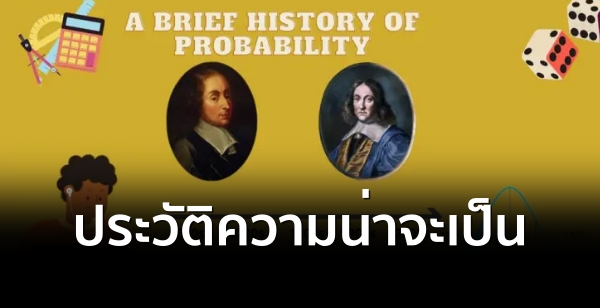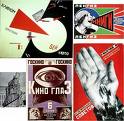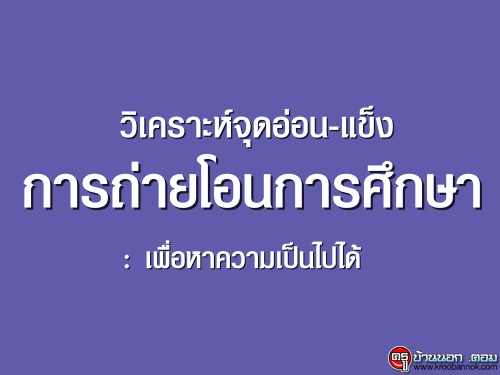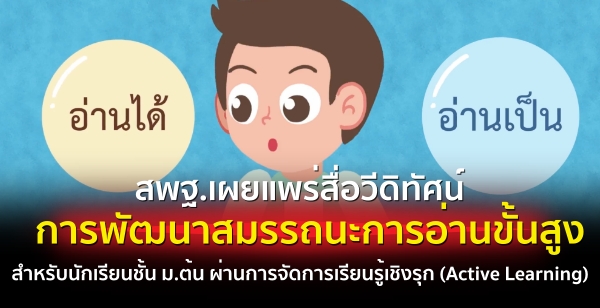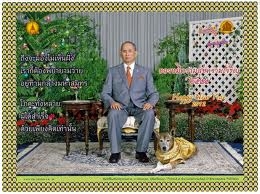ผู้วิจัย กาญจนา จันทมัตตุการ
ปีที่วิจัย 2562
บทคัดย่อ
การวิจัยครั้งนี้เป็นการวิจัยและพัฒนา (Research and Development) รูปแบบการบริหารเพื่อพัฒนาทักษะการคิดวิเคราะห์ของครูในโรงเรียนเทศบาล ๑ (ถนนนครนอก) (PIER Model) มีวัตถุประสงค์
1) เพื่อศึกษาการบริหารเพื่อพัฒนาทักษะการคิดวิเคราะห์ของครูในโรงเรียน 2) เพื่อสร้างและตรวจสอบรูปแบบการบริหารเพื่อพัฒนาทักษะการคิดวิเคราะห์ของครูในโรงเรียนเทศบาล ๑ (ถนนนครนอก) 3) เพื่อทดลองใช้รูปแบบการบริหารเพื่อพัฒนาทักษะการคิดวิเคราะห์ของครูในโรงเรียนเทศบาล ๑ (ถนนนครนอก) 4) เพื่อประเมินการใช้รูปแบบการบริหารเพื่อพัฒนาทักษะการคิดวิเคราะห์ของครูในโรงเรียนเทศบาล ๑ (ถนนนครนอก) มีขั้นตอนการดำเนินงานดังนี้ ขั้นตอนที่ 1 การศึกษาการบริหารเพื่อพัฒนาทักษะการคิดวิเคราะห์ของครู ซึ่งขั้นตอนที่ 1 ประกอบด้วย 3 ส่วน คือ การศึกษาเอกสารและงานวิจัยที่เกี่ยวข้องกับการบริหารเพื่อพัฒนาทักษะการคิดวิเคราะห์ การศึกษาสภาพการบริหารเพื่อพัฒนาทักษะการคิดวิเคราะห์ของครูในโรงเรียนเทศบาล ๑ (ถนนนครนอก) และการสัมภาษณ์ผู้ทรงคุณวุฒิที่มีความรู้และประสบการณ์เกี่ยวกับแนวการบริหารเพื่อพัฒนาทักษะการคิดวิเคราะห์ ขั้นตอนที่ 2 การสร้างและตรวจสอบรูปแบบการบริหาร
เพื่อพัฒนาทักษะการคิดวิเคราะห์ของครูในโรงเรียนเทศบาล ๑ (ถนนนครนอก) ซึ่งขั้นตอนที่ 2 ประกอบด้วย 2 ส่วน คือ การยกร่างรูปแบบการบริหารเพื่อพัฒนาทักษะการคิดวิเคราะห์ และการตรวจสอบคุณภาพ
ร่างรูปแบบการบริหารเพื่อพัฒนาทักษะการคิดวิเคราะห์ ขั้นตอนที่ 3 การทดลองใช้รูปแบบการบริหารเพื่อพัฒนาทักษะการคิดวิเคราะห์ของครู ขั้นตอนที่ 4 การประเมินผลการใช้รูปแบบการบริหารเพื่อพัฒนาทักษะการคิดวิเคราะห์ของครู ซึ่งขั้นตอนที่ 4 ประกอบด้วย 3 ส่วน คือ การประเมินผลการใช้รูปแบบ การประเมินผล การบันทึกติดตามการดำเนินงาน และการประเมินผลสะท้อนการใช้รูปแบบ โดยประยุกต์ใช้เทคนิควิธีการวิจัยผสานวิธี (Mixed-method) เพื่อยืนยันผลการวิจัย
ผลการศึกษาขั้นตอนที่ 1 ผลการศึกษาการบริหารเพื่อพัฒนาทักษะการคิดวิเคราะห์ของครู พบว่า การสร้างรูปแบบการบริหารเพื่อพัฒนาทักษะการคิดวิเคราะห์ ได้องค์ประกอบ 3 ด้าน คือ ทักษะการคิดวิเคราะห์ วิธีการพัฒนาทักษะการคิดวิเคราะห์ การบริหารเพื่อพัฒนาทักษะการคิดวิเคราะห์ ขั้นตอนที่ 2
ผลการสร้างและตรวจสอบรูปแบบการบริหารเพื่อพัฒนาทักษะการคิดวิเคราะห์ของครู โดยประยุกต์ใช้หลักการบริหารตามแนวคิด 7s McKinsey และการบริหารคุณภาพ วงจรเดมมิ่ง (Deming cycle) ในการสร้างรูปแบบ ในการตรวจสอบหาคุณภาพ โดยการสัมมนาอิงผู้เชี่ยวชาญ พบว่า ร่างรูปแบบการบริหาร
เพื่อพัฒนาทักษะการคิดวิเคราะห์ของครู ได้มีการปรับปรุงตามข้อเสนอแนะของผู้เชี่ยวชาญ จนมีความเหมาะสมก่อนนำไปทดลองใช้จริง ขั้นตอนที่ 3 ผลการทดลองใช้รูปแบบ ซึ่งขั้นตอนที่ 3 ประกอบด้วย 2 ส่วน คือ ผลการจัดทำคู่มือการดำเนินงานตามรูปแบบ พบว่า ผู้วิจัย กลุ่มตัวอย่างและทีมงานวิชาการของโรงเรียนสามารถใช้คู่มือเป็นกรอบการดำเนินการในขั้นตอนการทดลองใช้รูปแบบได้อย่างชัดเจนและมีประสิทธิภาพ และผลการทดลองใช้รูปแบบจากการบันทึกติดตามการดำเนินงานในการบริหารรูปแบบ พบว่า โรงเรียนมีการบริหารรูปแบบโดยวางระบบบริหารเพื่อพัฒนาทักษะการคิดวิเคราะห์ของครูกลุ่มตัวอย่าง โดยสร้างทีมวิชาการของโรงเรียนทำหน้าที่ติดตาม ให้คำแนะนำช่วยเหลือในกิจกรรมพัฒนาทักษะ การคิดวิเคราะห์ของครู ตลอดระยะเวลาการทดลอง พร้อมรายงานผลเพื่อบันทึกกิจกรรม สภาพการดำเนินงานและการเปลี่ยนแปลงของครูที่เกิดขึ้นตามสภาพจริง ขั้นตอนที่ 4 ผลการประเมิน การใช้รูปแบบ จากการประเมินโดยกลุ่มตัวอย่าง ครูจำนวน 48 คน พบว่า ครูมีความคิดเห็นต่อการใช้รูปแบบในด้านองค์ประกอบที่ 1 การบริหาร องค์ประกอบที่ 2 วิธีการพัฒนาทักษะการคิดวิเคราะห์ของครู องค์ประกอบที่ 3 ทักษะการคิดวิเคราะห์ ความเป็นไปได้ ความเหมาะสม และความเป็นประโยชน์ มีความเหมาะสมอยู่ในระดับดีมาก (x̄= 4.21) จากการประเมินผลการบันทึกติดตามการดำเนินงาน ซึ่งติดตามโดยทีมงานวิชาการ พบว่า รูปแบบการบริหารเพื่อพัฒนาทักษะการคิดวิเคราะห์ของครู ส่งผลต่อการเปลี่ยนแปลงต่อการพัฒนาทักษะการคิดวิเคราะห์ของครูสูงขึ้น และจากการประเมินผลสะท้อนการใช้รูปแบบโดยการวัดความสามารถการคิดวิเคราะห์ของนักเรียนที่เรียนกับครูกลุ่มตัวอย่างระดับชั้นประถมศึกษาปีที่ 1 - ชั้นประถมศึกษาปีที่ 6 วิเคราะห์ข้อมูลด้วยการทดสอบที (T-Test) พบว่า คะแนนผลการทดสอบหลังเรียน สูงกว่าคะแนนทดสอบก่อนเรียนอย่างมีนัยสำคัญทางสถิติที่ระดับ .01 จากการประเมินทั้งสามแหล่งข้อมูล ผลการประเมินสามารถยืนยันได้ว่ารูปแบบการบริหารเพื่อพัฒนาทักษะการคิดวิเคราะห์ของครู ในโรงเรียนเทศบาล ๑ (ถนนนครนอก) มีประสิทธิภาพและประสิทธิผลจริง
Title: Management Model for Developing the Skills of Analysis
Thinking for Teacher in Tessaban ๑ (Nakornnork Road) School
(PIER Model)
Researcher: Kanjana Jantamustukan
Year of research: 2019
Abstract
This research was the research and development of Management Model for
Developing the Skills of Analysis Thinking for Teacher in Tessaban ๑ (Nakornnork Road) School(PIER Model). There were four objectives in this study: 1) to study the management for developing the skills of analysis thinking for teacher in the school, 2) to create and examine the management model for developing the skills of analysis thinking for teachers in Tessaban ๑ (Nakornnork Road) School, 3) to experiment with the management model for developing in the skills of analysis thinking for teachers in Tessaban ๑ (Nakornnork Road) School, 4) to evaluate the management model for developing the skills of analysis thinking for teachers in Tessaban ๑ (Nakornnork Road) School. The research comprised four procedures as follows. Firstly, study the management for developing the skills of analysis thinking for teachers that
consisting of three sections, namely study documents and researchs relative to the
management for developing the analytical thinking skills, study the managerial thinking skills of teachers in Tessaban ๑ (Nakornnork Road) School, and interview the scholars in
management of analytical thinking skills. In the second stage, the creation and examination of management model for developing the analytical thinking skills for teachers that consisting of two sections, namely creating the form of management model for developing the analytical thinking skills and examing the management model of the analytical thinking skills. For the third stage, experimenting the management model for developing the analytical thinking skills for teachers. In the fourth stage, the evaluation of management model for developing the analytical thinking skills for teacher that consisting of three sections, namely evaluating the use of the management model, evaluating the observation record of action and evaluating the reflecting result from using the model that stage was applied by the Mixed-method
research in order to confirm the findings.
The findings of the study are as follows:
First stage, the results from study of management for developing the analytical thinking
skills were found that guidelines to create the management model which consisted of three compositions, namely the analytical thinking skills, the method for developing the analytical thinking skills and the management for developing the analytical thinking skills. In the second stage, the results of the creation and examination of management model that were applied by the 7 s McKinsey and Deming cycle concept and according to the experts in seminar were found that the form of management model for developing the analytical thinking skills was improved as the experts advice and was appropriate. For the third stage, the experimental results that the third stage consisting of two sections, namely the resultsof creating the action handbooks according to the model were found researcher, samples and school academic team could take it into guiding framework in such experiment efficiently and the experimental results of using the model, as the observation record of action was found that the school managed by setting management system supporting to develop teachers analytical thinking skills. That system had the school academic team doing duty; monitor, advise and help the teachers participating in several activities and report the researcher for concluding that and recording true action data. For the last stage, the result of using model from 48 samples were found that the composition in management, method of analytical thinking skills, analytical thinking skills, possibility, suitability and profitability is a high level appropriate (𝑥̅= 4.21). According to action record was found that the model resulted in developing the teachers at higher analytical thinking skills. Moreover, the result of reflection in managing the model was found that the analytical thinking exam score of students in primary 1-primary 6 that analysed data by t-test the post learning scores were higher than the pre learning scores which were significantly differ at the level of .01 and from evaluating above all sides, the findings could confirm that the management model for developing the analytical thinking skills for teachers was true efficient.


 ค้นหาทุกอย่างในเว็บครูบ้านนอก :
ค้นหาทุกอย่างในเว็บครูบ้านนอก :


















